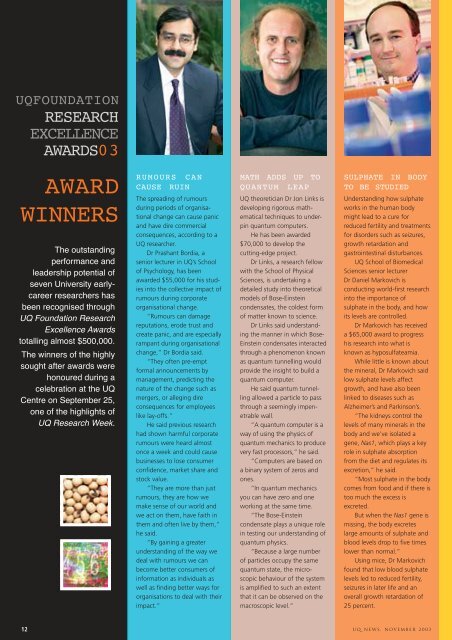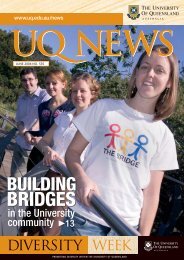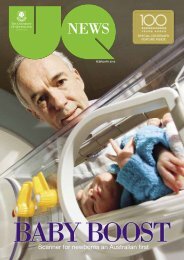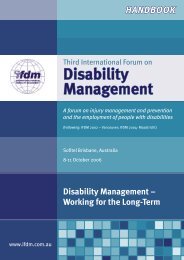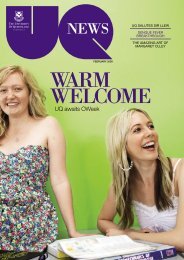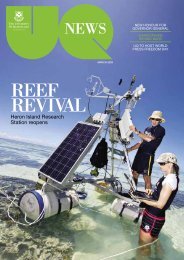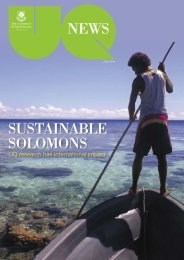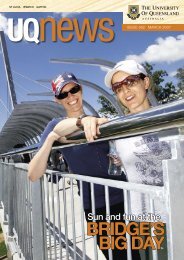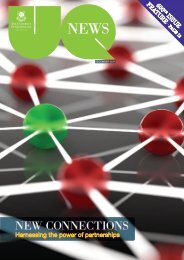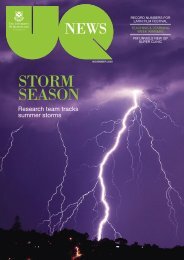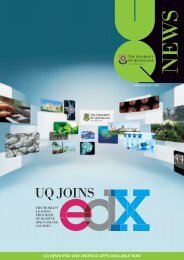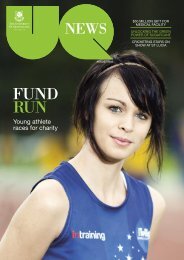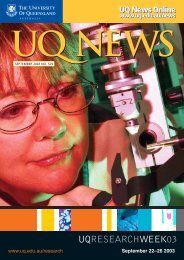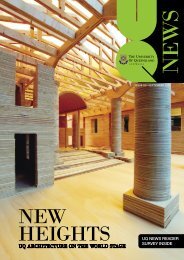01-07 cover Å - Office of Marketing and Communications - University ...
01-07 cover Å - Office of Marketing and Communications - University ...
01-07 cover Å - Office of Marketing and Communications - University ...
You also want an ePaper? Increase the reach of your titles
YUMPU automatically turns print PDFs into web optimized ePapers that Google loves.
UQFOUNDATION<br />
RESEARCH<br />
EXCELLENCE<br />
AWARDS03<br />
AWARD<br />
WINNERS<br />
The outst<strong>and</strong>ing<br />
performance <strong>and</strong><br />
leadership potential <strong>of</strong><br />
seven <strong>University</strong> earlycareer<br />
researchers has<br />
been recognised through<br />
UQ Foundation Research<br />
Excellence Awards<br />
totalling almost $500,000.<br />
The winners <strong>of</strong> the highly<br />
sought after awards were<br />
honoured during a<br />
celebration at the UQ<br />
Centre on September 25,<br />
one <strong>of</strong> the highlights <strong>of</strong><br />
UQ Research Week.<br />
RUMOURS CAN<br />
CAUSE RUIN<br />
The spreading <strong>of</strong> rumours<br />
during periods <strong>of</strong> organisational<br />
change can cause panic<br />
<strong>and</strong> have dire commercial<br />
consequences, according to a<br />
UQ researcher.<br />
Dr Prashant Bordia, a<br />
senior lecturer in UQ’s School<br />
<strong>of</strong> Psychology, has been<br />
awarded $55,000 for his studies<br />
into the collective impact <strong>of</strong><br />
rumours during corporate<br />
organisational change.<br />
“Rumours can damage<br />
reputations, erode trust <strong>and</strong><br />
create panic, <strong>and</strong> are especially<br />
rampant during organisational<br />
change,” Dr Bordia said.<br />
“They <strong>of</strong>ten pre-empt<br />
formal announcements by<br />
management, predicting the<br />
nature <strong>of</strong> the change such as<br />
mergers, or alleging dire<br />
consequences for employees<br />
like lay-<strong>of</strong>fs.”<br />
He said previous research<br />
had shown harmful corporate<br />
rumours were heard almost<br />
once a week <strong>and</strong> could cause<br />
businesses to lose consumer<br />
confidence, market share <strong>and</strong><br />
stock value.<br />
“They are more than just<br />
rumours, they are how we<br />
make sense <strong>of</strong> our world <strong>and</strong><br />
we act on them, have faith in<br />
them <strong>and</strong> <strong>of</strong>ten live by them,”<br />
he said.<br />
“By gaining a greater<br />
underst<strong>and</strong>ing <strong>of</strong> the way we<br />
deal with rumours we can<br />
become better consumers <strong>of</strong><br />
information as individuals as<br />
well as finding better ways for<br />
organisations to deal with their<br />
impact.”<br />
MATH ADDS UP TO<br />
QUANTUM LEAP<br />
UQ theoretician Dr Jon Links is<br />
developing rigorous mathematical<br />
techniques to underpin<br />
quantum computers.<br />
He has been awarded<br />
$70,000 to develop the<br />
cutting-edge project.<br />
Dr Links, a research fellow<br />
with the School <strong>of</strong> Physical<br />
Sciences, is undertaking a<br />
detailed study into theoretical<br />
models <strong>of</strong> Bose-Einstein<br />
condensates, the coldest form<br />
<strong>of</strong> matter known to science.<br />
Dr Links said underst<strong>and</strong>ing<br />
the manner in which Bose-<br />
Einstein condensates interacted<br />
through a phenomenon known<br />
as quantum tunnelling would<br />
provide the insight to build a<br />
quantum computer.<br />
He said quantum tunnelling<br />
allowed a particle to pass<br />
through a seemingly impenetrable<br />
wall.<br />
“A quantum computer is a<br />
way <strong>of</strong> using the physics <strong>of</strong><br />
quantum mechanics to produce<br />
very fast processors,” he said.<br />
“Computers are based on<br />
a binary system <strong>of</strong> zeros <strong>and</strong><br />
ones.<br />
“In quantum mechanics<br />
you can have zero <strong>and</strong> one<br />
working at the same time.<br />
“The Bose-Einstein<br />
condensate plays a unique role<br />
in testing our underst<strong>and</strong>ing <strong>of</strong><br />
quantum physics.<br />
“Because a large number<br />
<strong>of</strong> particles occupy the same<br />
quantum state, the microscopic<br />
behaviour <strong>of</strong> the system<br />
is amplified to such an extent<br />
that it can be observed on the<br />
macroscopic level.”<br />
SULPHATE IN BODY<br />
TO BE STUDIED<br />
Underst<strong>and</strong>ing how sulphate<br />
works in the human body<br />
might lead to a cure for<br />
reduced fertility <strong>and</strong> treatments<br />
for disorders such as seizures,<br />
growth retardation <strong>and</strong><br />
gastrointestinal disturbances.<br />
UQ School <strong>of</strong> Biomedical<br />
Sciences senior lecturer<br />
Dr Daniel Markovich is<br />
conducting world-first research<br />
into the importance <strong>of</strong><br />
sulphate in the body, <strong>and</strong> how<br />
its levels are controlled.<br />
Dr Markovich has received<br />
a $65,000 award to progress<br />
his research into what is<br />
known as hyposulfateamia.<br />
While little is known about<br />
the mineral, Dr Markovich said<br />
low sulphate levels affect<br />
growth, <strong>and</strong> have also been<br />
linked to diseases such as<br />
Alzheimer’s <strong>and</strong> Parkinson’s.<br />
“The kidneys control the<br />
levels <strong>of</strong> many minerals in the<br />
body <strong>and</strong> we’ve isolated a<br />
gene, Nas1, which plays a key<br />
role in sulphate absorption<br />
from the diet <strong>and</strong> regulates its<br />
excretion,” he said.<br />
“Most sulphate in the body<br />
comes from food <strong>and</strong> if there is<br />
too much the excess is<br />
excreted.<br />
But when the Nas1 gene is<br />
missing, the body excretes<br />
large amounts <strong>of</strong> sulphate <strong>and</strong><br />
blood levels drop to five times<br />
lower than normal.”<br />
Using mice, Dr Markovich<br />
found that low blood sulphate<br />
levels led to reduced fertility,<br />
seizures in later life <strong>and</strong> an<br />
overall growth retardation <strong>of</strong><br />
25 percent.<br />
12 UQ NEWS, november 2003


